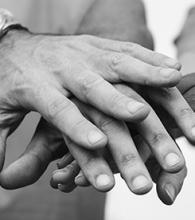Archival Notice
This is an archive page that is no longer being updated. It may contain outdated information and links may no longer function as originally intended.
by Matt Dummermuth
In seconds, a peaceful morning turned into a national tragedy. A man rushed into Pittsburgh's Tree of Life Synagogue and began shooting, killing 11 and injuring six more, including four police officers. The suspect faces multiple federal hate crime and state charges for the attack last September, which The Washington Post called "the deadliest on Jews in U.S. history."
With depressing frequency, we hear about crimes that are apparently motivated by hate against a religious group. Most recently, a shooter appeared at a synagogue in Poway, California, killing one and injuring three. On Easter Sunday, terrorists attacked Sri Lankans at three churches as they attended worship services, as well as three hotels, killing 253. In March, a perpetrator targeted peaceful worshippers in two New Zealand mosques, stealing the lives of 50.
"Violence on the basis of religion is evil," said Attorney General William F. Barr on the day of the attack in New Zealand, which he described as "a sobering reminder that the threat of political and religious violence is real, and that we must remain vigilant against it."
News of shootings like these takes me back to the early years, following September 11, 2001, when I served in the Justice Department's Civil Rights Division. For example, just two days after the terrorist attacks, a man in Seattle set fire to cars in the parking lot of a mosque and then fired at worshippers as they fled the building. The Justice Department convicted the man and he received a 6.5 year sentence. That was just one of many hate crime convictions the department won in the immediate aftermath of 9-11.
Since 2001, the number of hate crimes fueled by religious bias has grown. It was behind one in every five hate crimes in 2017, according to the FBI, second only to race as a motivating factor. Today, we remain committed to prosecuting and punishing those who violate the civil rights of any American, including religious people.
The Office of Justice Programs plays a significant role in the fight against hate crimes violence, no matter what powers it. We are working to open the door for victims to come forward because, as research by our Bureau of Justice Statistics reveals, victims reported only slightly more than half of all hate crimes—55 percent—to police from 2015 to 2017. According to additional BJS research, victims say they feel vulnerable, and often don't believe police will take their cases seriously.
OJP helps alleviate these anxieties through services offered by state victim assistance and compensation programs supported by our Office for Victims of Crime. OVC makes available statewide assistance to victims of hate crimes, and we encourage law enforcement or state-based agencies to use them. Through funding from the Victims of Crime Act, for example, they could develop a program to provide victim services and educate on the importance of reporting hate crimes. A department-wide Hate Crimes Enforcement and Prevention Initiative includes a website that serves as a one-stop portal to all of DOJ's resources to combat hate crimes. And a recent grant from our National Institute of Justice is surveying 3,000 law enforcement agencies about local policies on reporting hate crimes to help us identify the best ways to encourage victims of individual attacks to come forward and the best ways to support them when they do.
NIJ recently released another tool: the Safeguarding Houses of Worship App. Available free of charge, the app helps religious facilities work with local law enforcement officers to evaluate building security and create plans for preventing attacks.
OJP is committed to helping law enforcement professionals more effectively detect, respond to and stop hate crimes—and to enabling them to help victims get the services they need. Fighting hate crimes, even understanding the forms they take, is complicated. One thing stands out to me: hate crimes affect us all. No one—not the victim, not his or her group, nor the public at large—escapes a hate crime unharmed.



